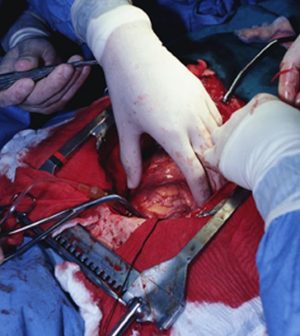- Could Your Grocery Store Meat Be Causing Recurring UTIs?
- Are You Making This Expensive Thermostat Error This Winter?
- Recognizing the Signs of Hypothyroidism
- 10 Strategies to Overcome Insomnia
- Could Artificial Sweeteners Be Aging the Brain Faster?
- Techniques for Soothing Your Nervous System
- Does the Water in Your House Smell Funny? Here’s Why
- Can a Daily Dose of Apple Cider Vinegar Actually Aid Weight Loss?
- 6 Health Beverages That Can Actually Spike Your Blood Sugar
- Treatment Options for Social Anxiety Disorder
Obesity Slows Recovery for Heart Surgery Patients: Study

Obese heart surgery patients spend more time in intensive care and take longer to recover than those who aren’t obese, a new Canadian study finds.
Researchers examined data from nearly 5,400 patients who had heart surgery at the New Brunswick Heart Center between January 2006 and December 2013. Of those, 36 percent were obese.
After heart surgery, obese patients were four times more likely to need extra time in the ICU; three times more likely to need extra time on mechanical ventilation; and three times more likely to be readmitted to the ICU, the study showed.
Obese patients also had longer overall hospital stays and were more likely to be discharged with home care.
It all adds up to more labor-intensive and costly care for these patients, according to the researchers.
The study was published online Aug. 10 in The Annals of Thoracic Surgery.
“Obesity is a growing problem for society that has reached epidemic proportions,” lead author Dr. Brandon Rosvall said in a journal news release. “In our study, we saw that as patients became more obese, the hospital resources required to care for them after heart surgery also increased.”
Rosvall, a medical student at Dalhousie Medicine New Brunswick, said patients should be aware that obesity may impede recovery from heart surgery.
“More in-depth conversations regarding surgical risks and alternatives to surgery should take place with obese patients so that they are aware of the true impact of increased obesity. While obesity has become a social issue, it is one that can be addressed on a personal level. By working with their health care providers, patients can learn how to achieve and maintain a healthy body weight,” he suggested.
Rosvall said research is underway on specific molecules in the blood called biomarkers that might help doctors predict how obese patients will fare after heart surgery.
More than a third of American adults are obese, according to the U.S. Centers for Disease Control and Prevention. The estimated medical cost of obesity in the United States was $147 billion in 2008, according to the latest available data. That’s $1,429 more for each obese patient than for someone whose weight is normal.
More information
The U.S. National Heart, Lung, and Blood Institute has more on heart surgery.
Source: HealthDay
Copyright © 2026 HealthDay. All rights reserved.










